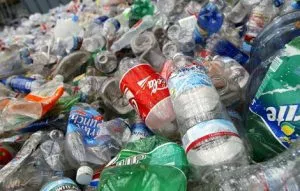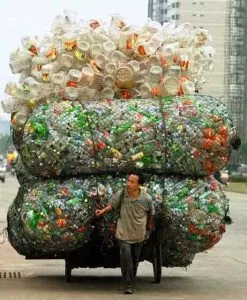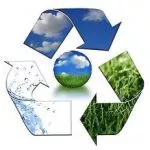Plastic bottles pollution: impact & solutions
The plastic industry has a continuous growth worldwide since over 50 years.

The plastic industry has a continuous growth worldwide since over 50 years. Plastic attributes like rigidity, strength and flexibility makes it – still today – a choice material. But only 31% of plastics are recycled in US, according to the Trade organization NAPCOR. This considerable use in almost all sectors and industries causes an environmental pollution that already affects our day-to-day lives. Yet smart solutions exist to avoid plastic pollution.
What are the consequences of plastic pollution?
 Experience it yourself: how many plastic items do you see around you? Impressive isn’t it? Plastic is everywhere and causes great damage to the planet. Taking the example of plastic water bottles, for every 6 of them only 1 makes it to the recycling bin. The other 5 are sent to landfills or end up as trash on the land and in rivers, lakes and the ocean. They take hundreds of years to disintegrate and are responsible of the so-called Garbage Patch, that is a collection of marine debris in the North Pacific Ocean.
Experience it yourself: how many plastic items do you see around you? Impressive isn’t it? Plastic is everywhere and causes great damage to the planet. Taking the example of plastic water bottles, for every 6 of them only 1 makes it to the recycling bin. The other 5 are sent to landfills or end up as trash on the land and in rivers, lakes and the ocean. They take hundreds of years to disintegrate and are responsible of the so-called Garbage Patch, that is a collection of marine debris in the North Pacific Ocean.
Here are some negative incidences caused by the bottles pollution:
- Deadly effect on wildlife. The large pieces of plastic threaten the marine fauna causing injuries or mutilation to animals that become entangled in fishing nets or plastic bags for instance. Another infamous example: the turtles choking on plastic debris that they mistake for jellyfish.
- Impact on the food chain. Over time, polluting plastics break down into small toxic particles in the ocean and affect the marine ecosystems from plankton to whales. When the tiniest organisms get poisoned due to plastic ingestion, they disrupt the larger animals depending on them for food. As a fact, plastic may be present in the fish that the common households eat every day.
- Groundwater and air pollution. When the precipitation falls into the landfills where plastic is stored, it produces a toxic leachate considered as a major threat to the quality of our groundwater. On the other side, burning plastic can release carbon monoxide, furans and dioxins into the air. The polluted air when inhaled by humans and animals affects their health and can cause respiratory and cardiovascular problems, among others.
- Unreasonable cost. The financial impact of plastic waste is staggering. According to a report from the Ellen Mc Arthur Foundation and the Mc Kinsey Institute: most plastic packaging is used only once; 95% of the value of plastic packaging material, worth $80-120 billion annually, is lost to the economy. Excessive pollution may also decrease tourism in some affected areas, dramatically impacting their economies.
What are the solutions?
- Shop intelligently. Purchase reusable bags, and packages. Choose plastic-free items like bamboo ustensils, stainless steel bottles or glass containers for instance. You will help the humanity and the planet… and you will save a lot of money.
- Sort and recycle. Try to decrease your amount of garbage and sort correctly the items that cannot be reused. Check every little thing that you put in the trash: more and more waste can be recycled nowadays.
 Make your voice heard. Get involved and do not hesitate to share your ideas with your local businesses. Solutions do exist to switch from the polluting packaging and storing items to greener ones. Many companies are starting to come up with excellent low-cost replacements, such as B-Cap with their dosing cap technology that can be placed on almost every size of bottles.
Make your voice heard. Get involved and do not hesitate to share your ideas with your local businesses. Solutions do exist to switch from the polluting packaging and storing items to greener ones. Many companies are starting to come up with excellent low-cost replacements, such as B-Cap with their dosing cap technology that can be placed on almost every size of bottles.- Try tap water. Health experts generally recommend to drink a minimum of 1,5 liter of water every day. To avoid buying countless bottle packs, many families started to drink tap water. If you do not like the taste, you can add a squeeze of lemon or use a dosing cap to flavour your drink.
We hold the key to reducing the amount of plastic waste and minimizing our environmental footprint. You wish to become – or already are – a green consumer? Check out the eco-solution developed by B-Cap to help companies lead the way.

 Make your voice heard. Get involved and do not hesitate to share your ideas with your local businesses. Solutions do exist to switch from the polluting packaging and storing items to greener ones. Many companies are starting to come up with excellent low-cost replacements, such as B-Cap with their dosing cap technology that can be placed on almost every size of bottles.
Make your voice heard. Get involved and do not hesitate to share your ideas with your local businesses. Solutions do exist to switch from the polluting packaging and storing items to greener ones. Many companies are starting to come up with excellent low-cost replacements, such as B-Cap with their dosing cap technology that can be placed on almost every size of bottles.